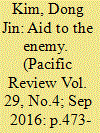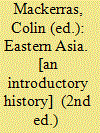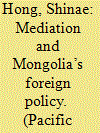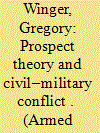|
|
|
Sort Order |
|
|
|
Items / Page
|
|
|
|
|
|
|
| Srl | Item |
| 1 |
ID:
146645


|
|
|
|
|
| Summary/Abstract |
This article discusses the link between development and peacebuilding to analyze South Korean aid activities in North Korea in the context of the Korean conflict, where there are deep-rooted cycles of conflict episodes, and to explore the possibility of aid for peace on the Korean peninsula in the future. The Korean conflict is a large part of what makes South Korean aid to North Korea ineffective. For the past 20 years, South Korean aid to North Korea has fluctuated greatly, due to the context of the Korean conflict. The Korean conflict, once seemingly on the way to resolution, appears to have reverted to a time before the end of the Cold War. Many people in both the North and the South still see each other as the enemy. Most of the South Korean aid projects in North Korea have been suspended indefinitely and the fluctuation of aid to North Korea caused serious debates within South Korean society. At one point, the debates grew so heated that they were called the ‘South–South conflict’. Building on the conceptual framework of conflict sensitive development and strategic peacebuilding, this article argues that, to overcome the current impasse, all stakeholders must better understand the context of the Korean conflict and the interaction between the context and themselves, and develop a comprehensive strategy together, to encompass the multiple issues raised by the Korean conflict, as strategic peacebuilding proposes.
|
|
|
|
|
|
|
|
|
|
|
|
|
|
|
|
| 2 |
ID:
186608


|
|
|
|
|
| Summary/Abstract |
With its Ulaanbaatar Dialogues (UBD) initiatives, Mongolia has emerged as one of the most increasingly influential diplomatic powerhouses in northeast Asia, despite its small size. Moved by the mixed interests of garnering global influence and a small-state security strategy, the country has positioned itself as an honest neutral peace broker in the Korean conflict since 2013. Mongolia has demonstrated itself to be a successful third party in defusing tensions and, more crucially, jump-starting declining regional multilateral mechanisms for the Korean peace process. This study explores the undiscovered potential of small-state power. Mongolia shows how small states effectively increase their transnational appeal and expand their foreign policy reach through diplomatic mediation. This article examines the sources, strategies, and mechanisms of Mongolia’s mediation efforts, looking at the core features of Mongolian foreign policy and its diplomatic relations, and then focuses on the UBD initiatives – the country’s efforts as a third party to mediate the Korean Peninsula peace process. Thereby, this study contributes to the knowledge on the practice of international relations by reflecting on the burgeoning role of the Global South.
|
|
|
|
|
|
|
|
|
|
|
|
|
|
|
|
| 3 |
ID:
006514


|
|
|
|
|
| Edition |
2nd ed.
|
| Publication |
Melbourne, Longman, 1995.
|
| Description |
xi, 676p.pbk
|
| Standard Number |
0582806607
|
|
|
|
|
|
|
|
|
|
|
|
Copies: C:1/I:0,R:0,Q:0
Circulation
| Accession# | Call# | Current Location | Status | Policy | Location |
| 038249 | 950/MAC 038249 | Main | On Shelf | General | |
|
|
|
|
| 4 |
ID:
185991


|
|
|
|
|
| Summary/Abstract |
Over the past decade, the small state of Mongolia has emerged as an important player in Northeast Asia through its mediation efforts. Driven by a desire for regional and global influence and prestige, Mongolia has sought to locate itself as a neutral intermediary in regional conflicts—in particular the Korean peninsula’s peace process, by hosting the “Ulaanbaatar Dialogue” starting in 2013. In this regional security dialogue initiative, Mongolia has proven itself to be a capable peace broker in easing tensions between the two parties, and, more crucially, it has made a constructive impact on the regional security architecture by building a functioning multilateral dialogue mechanism to support the Korean peninsula peace process after the halt of the six-party talks. Its success has been aided by its perceived impartiality in the conflict; its multilateral, activist, peace-oriented foreign policy portfolio; and its cordial external relations with regional countries, including both North and South Korea, and globally. This article seeks to contribute to the understanding of the varied abilities, strategies, and sources of advantage employed by small states to project power and raise their influence in regional affairs by exploring the case of Mongolia.
|
|
|
|
|
|
|
|
|
|
|
|
|
|
|
|
| 5 |
ID:
030023


|
|
|
|
|
| Publication |
New York, Harcourt, Brace & world Inc., 1970.
|
| Description |
x, 385p.pbk
|
| Standard Number |
0155610007
|
|
|
|
|
|
|
|
|
|
|
|
Copies: C:1/I:0,R:0,Q:0
Circulation
| Accession# | Call# | Current Location | Status | Policy | Location |
| 004639 | 950/MOD 004639 | Main | On Shelf | General | |
|
|
|
|
| 6 |
ID:
155828


|
|
|
|
|
| Summary/Abstract |
This article investigates the potential use of prospect theory to understand civil–military disputes over the use of force. Specifically, I argue that distinct realms of responsibility can lead civilian and military authorities to inhabit different frames of reference when confronting the same crisis. This divergence in perspective causes each to asses risk in fundamentally disparate ways and ultimately produces competing policy recommendations. To illustrate this theory, I analyze the case of the 1976 Korean tree cutting incident. During this crisis, American military authorities define the situation narrowly as pertaining to the Korean peninsula, whereas the civilian leadership viewed it as part of a global challenge to American resolve. As a result, each party weighed the risks of escalation differently and promoted conflicting policy prescriptions.
|
|
|
|
|
|
|
|
|
|
|
|
|
|
|
|
|
|
|
|
|